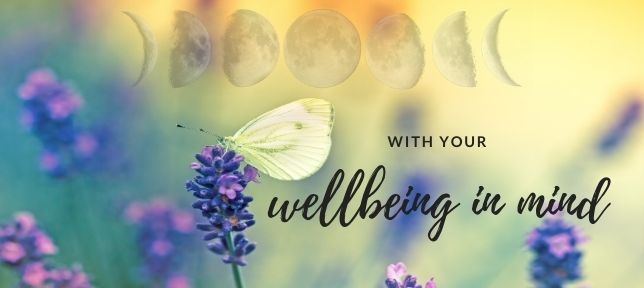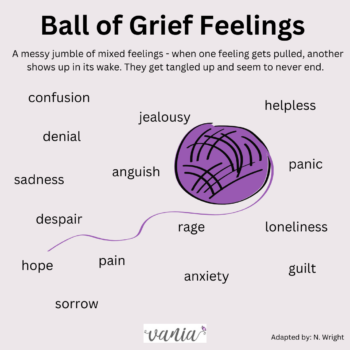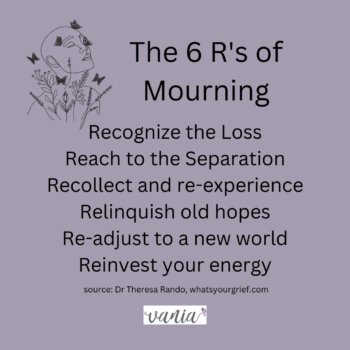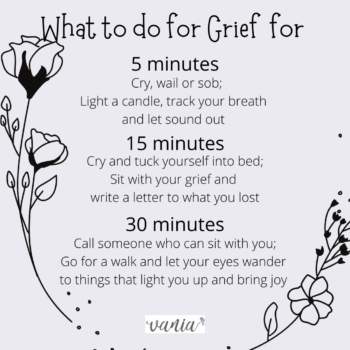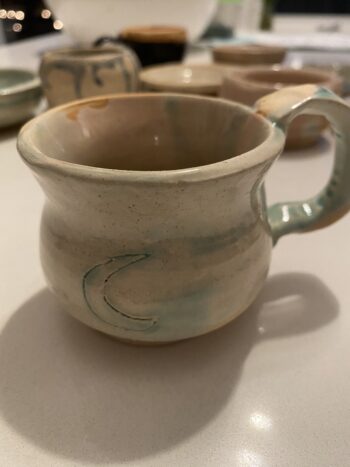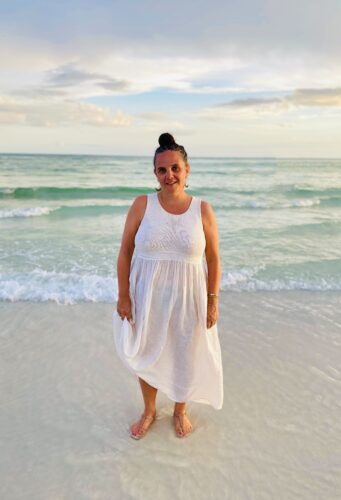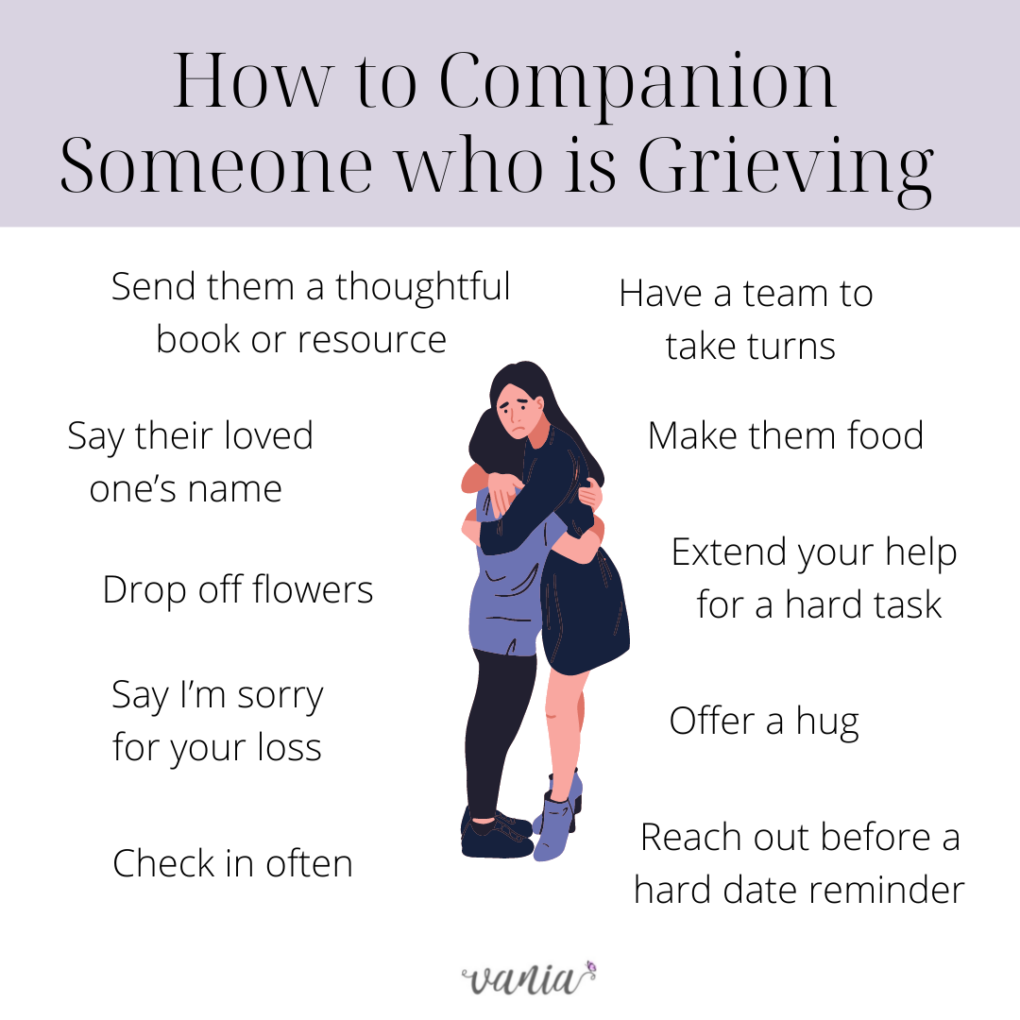Grief is a shapeshifter.
The last time i saw my mother alive was two years ago on Mother’s Day. She died the next day and i think she waited to die so that i wouldn‘t have this connection to Mother’s Day. It was a shock and created a sea change in my life that has been both the worst experience of my life, and has led me into a new sense of self.
I was tasked with the onoging responsibility of going through my mother’s lifetime of belongings, where she left a collection of Ariel-like interesting objects (both well-used and unused) as well as finding secret notes.
Through the process of purging my mother’s belongings I gleaned more awareness and new clarity, a sense of self that needed to transition. It is through this intentional grief work that I have come to see a more full sense of self, and one that will also not continue how my mother martyred herself, and ultimately lost her Self to others. It was only through this loss that I have embraced parts of me that have been hidden, and sitting dormant.
Cleaning out her closets has been a journey to find my full self. In purging and organizing, i have been faced with so more truths and discoveries i didn’t bargain for. Here are some of my biggest treasures.
Don’t Wait For Joy
One of the things i found was a purse my mom bought that was a fraternal twin to my own. I think we bought them together, on purpose. We were cute like that sometimes. Or at least that’s how i’m holding the story now. The big difference is what we did with the things we bought after. My purse is long-gone now; well-used and loved but gone. My mom’s was still sitting in her walk-in closet with the tags on it. It has been sitting there for at least 25 years. I don’t know if it was an item of pride for her or regret for buying it in the first place. I now have this bag and plan to give it a new life, similar to Amelie’s travelling gnome in that incredible movie.
Going through her things, i fell upon an unopened and hidden away chocolate bar. It was hidden in a box at the back of her closet, sitting among her important papers like her marriage certificate, receipts, and other seemingly important but forgotten documents. Ironically, i remember her telling me that she would hide some things from her husband, so that he wouldn’t pounce on the best things and not share. Funnily, i guess no one got to share this.
Finding it brought the floodgates back to my eyes, which has happened many times in the last year.
And yet, it was this specific chocolate bar, a reminder of my childhood and Eastern European roots, that really shifted me. She was saving this treat for herself, for a time that she could enjoy it. That time never came, and not because she died, but because she never seemed to find herself worthy of it. See, this bar of chocolate expired in 2014, and she died years later.
She never found the right time for one of the simplest pleasures in life: To eat the Chocolate.
Martyrdom is Patriarchal Mothering
Another big learning i am gleaning from these years without a mom is a commitment to not martyr myself as my mom did. I know i was one of the beneficiaries of that martyrdom and Mother Victim mentality, and yet it also created a wedge between us that was never repaired.
My mom regretted not living her life fully, not not sharing her feelings – that I heard about only all too well.
I am encouraging myself now to not wait for my own pleasure, and it’s a way that I am embodying my own manifesto of life – to not become a version of myself that first offers the best to others.
As a mother myself, this was a jarring realization for me. It showed me just how much my mother martyred herself, and learned to internalize a patriarchal way of mothering – putting her own needs and joy at the bottom of the priority list. This is not the legacy I want to carry for her, because she was so much more than this, and yet it took her death for me to see that. In her death, I want to honour her full life, and not just from my viewpoint as her daughter.
My mom was the first to tell, on repeat, what she sacrificed in order for my sister and i to have a better life than her. As a parent myself now, i can look back at those years with reverence to her and also a commitment to not lose myself to my roles as a mother, therapist, and partner. I know see that the only person whose life i am beholden to is my own, and i don’t want to wait to have the chocolate, or use the fun purse.
I am Her Legacy
My mom intentionally left hidden treasures for my sister and i. She hid some cash in the pocket of a house coat, knowing full well her husband (my dad) would never look there, nor do the work to clear out her things. She knew it would us who found it, and maybe the only money we would get. The things she left behind is not her legacy. The cottage and her belongings are just mere artefacts of her life.
What is her legacy or teaching is to embrace life as she only dreamed of. To live a slow and beautiful life.
These days, I honour my Mom in ome of the practices i first learned from her, whether it’s being a Herb Witch or antiquing. In the words of Marissa Renee Lee in her beautiful book Grief is Love she shares that “in order for you to become someone’s legacy when they die, you are required to change. Your transformation is their legacy …. You are their legacy”… ”Legacy is based on the fact that there is someone you loved dearly and who loved you back, and that love now lives on through you. When we can bring their spirit, their essence, back to life we keep our people alive, letting them continue to live through us and those we love.”
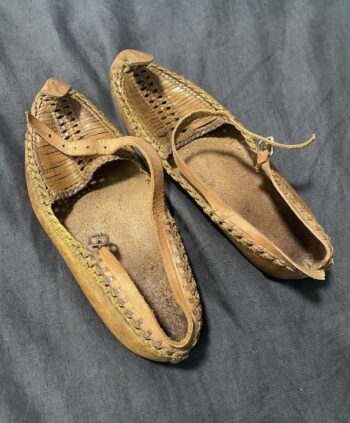
Ancestral Roots
My mother immigrated to Canada in her 20’s, and she left behind her own mother and family. In fact, both of my parents had to establish themselves in a new country without roots of their own. As an immigrant whose country of origin was being torn apart, my mother struggled with finding her true sense of self – and this polarization impacted her ability to truly land in her body, life and own story. She faced her own rites of passage without an elder to guide her, and I now realize she did so alone. Through my own metamorphosis called perimenopause, i was met face to face with the revelation that i did not know my own mother’s experience with it. I am seeing in real time what it’s like to enter the rite of passage of perimenopause without my own mother as a guide in physical form.
As a teenager, one of the ways i rebelled against my parents was in the most child-of-immigrants way – i lost my Mother tongue language. Now, as an adult it is one of my deepest regrets. So when i found old traditional Serbian dancing shoes, dolls, and table clothes, i reclaimed them and brought them home. Recently, one of my commitments to my mom and heritage is to find my way back home to my ancestral language and lands.
Don’t Dance with Regret
Speaking of regrets, i do hold so much regret for the time that was taken from me. There is a difference between dwelling in feelings of regret versus acknowledging the regret so that it can be held, witnessed and then processed. I know i can’t get in a fancy DeLorean car and go back to the past so regret of what i know now but didn’t back then is not helpful. I am working on not letting the guilt creep in that reminds me i could have had more time with my mom when she was alive. The adult parts in me also grieve the relationship that couldn’t heal or evolve in time.
I often wonder where is the place for regret in the stages of grief? There is so much i regret with this loss:
*I regret not hugging her that last time
*The kids not getting that sleepover
*Not taking her shopping
*Not staying that last day
*Missing the chance to ask about the big stuff like perimenpause, her dreams
*Not getting the opportunity to tell her how much i loved her, my awe of what she could do for herself
*Village life and doing it all alone
*Learning too late about feminine archetypes and the gift of Elder Crone wisdom
Don’t Bypass the Grief Wave – Do the Grief Work
Becoming a mother we are surrounded by well-intentioned people trying to help. Losing your mother seems like a process we suffer through alone. Whatever our own relationship with our mothers, knowing this loss is different from other kinds means we need to have others resonate and connect with us. It is yet another club we join without ever wanting to, and at the same time it offers us more shared humanity than we ever thought we could.
Western society has become grief illiterate, as we become more individualistic and severed from our emotions and lineages. It was becoming a griever myself that showed me just how alone we are in this experience. I became my own companion when I realized that no one else could carry this pain for me, or with me. We all need to apprentice with Grief work means to find meaning in the loss – not of the loss of our beloved, but rather for what our life is now that they are gone. This is a task of mourning and we are not meant to do it alone, we in fact need community to witness it and hold us.
“Do not feel like you were betraying your person by experiencing joy” writes Marissa Renee Lee. Experiencing joy is one of the many ways you can continue to love them. Joy is a basic right. We grieve because the love isn’t what died.
Grief work is subversive cultural shadow work because it is committed to acknowledging death in an individual and collective way. Death is not the end. Rather, it serves as a powerful step for alchemical transformation. Perdita Finn explains this even more in her beautiful book, Take Back the Magic.
Nature shows us that life mirrors a spiral dance with the cycle of life from birth, death and a possible rebirth.
Share the Appreciation
It’s not lost on me that i found my parent’s marriage certificate months after my mom’s death. What was a surprise was what was in the random shoebox in the back of the closet with these important papers: 2 cards that i gave my mom when i was in my early 20’s. She kept them all this time, and kept them in this box. Why she did this will forever be a mystery for me. I like to think it’s because they were two rare cards of me telling her i was proud of her, and that i loved her, and that i was thankful of her.
This was a lesson in always taking time to show appreciate, gratitude and love towards the people who not only deserve it but also who you might take for granted. I know my mom loved me, and i accepted her love language. What i also know is that i learned too late in my own life to reciprocate it.
Rituals for Gates of Grief
The loss of an elder before she could be one and i could appreciate her is a Gate of Grief. Francis Weller talks about these gates in his transformative book The Wild Edge of Sorrow. It has taken me in my almost 50-year old experience to know that i don’t only want but i need an elder. It has been through my own experience with perimenopause that I am noticing how similar my life is to my mom’s and where I need to make sure my life is altogether my own. Further, as I become more versed and passionate about feminine archetypes, an additional sense of loss is not having a matriarch or crone in my life now, to be a guide and mentor. Right when i was realize that i not only wanted one, but needed a Wise Elder, my mom was taken from me.
This treasure chest of discoveries has been a rite of passage for me, as it provides support to this new sense of self. You could call it a ritual of sorts.
October is known as a grief month, where the veil is thin between our world and the departed. This is the time for ceremony and ritual that honours our dearly departed, both recently and not. Our overculture has forgotten the roots of Samhain (known now as Hallowe’en) and the sacredness of ritual that honours our dead ancestors. Of the the biggest treasures i have dug up with this loss is my devotion to sacred practices, soul retrieval work, and creating rituals in my everyday life.
Transformative is Not Inevitable
According to David Kessler, the stage of Finding Meaning after experiencing such an impactful loss offers healing benefits. That doesn’t mean this stage is automatic. My mom’s death became a catalyzing moment for me. Not just in the way you might think, but in a deeper sense of shaking my Self out of me. It allowed me to access a spiritual practice and my sense of Self came back to life. I took time to really think about how I wanted to honour her in her death. I packed a special kit of meaningful items for her to take with her on her next journey after life. This is something she did for me. And yet it was also a way for me to really Align with the witchy side of me. It also was the one way i could truly give back reciprocal care to her, and show her that her love language was heard. I think it was also a way for me to highlight that i understood something powerful – death is not the end.
I saw a quote by Kimberley Jones a few months ago. It inspired me to notice that my mom birthed me twice: on the day I was born from her body and the day she died, a new birth of Me happened. Her death lead to my own butterfly effect or catalyst to become more versed, literate and comfortable with death work.
It has been through this process of purging my mother’s belongings and embracing the loss of her that I was confronted by my own sense of self, and ultimately finding meaning in my own life. It has created a newfound commitment to not martyr herself as my mom did. It was only through the loss that I could embrace parts of me that have been hidden, and sitting dormant in my psyche for years. Finding these forgotten treasures served as a wake-up call – a pristine and never-used purse is a revealing awakening for me to not wait for life to happen, nor wait to enjoy life, but rather be present in it now.
Luckily, i found my mom’s treasures, similar to Ariel’s treasures in the Little Mermaid before i lost my own voice and Self.

